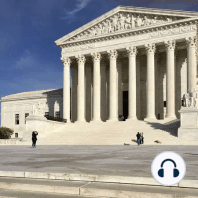5 min listen

Trump v. Anderson (Sotomayor, Kagan, Jackson Concurrence)
Trump v. Anderson (Sotomayor, Kagan, Jackson Concurrence)
ratings:
Length:
11 minutes
Released:
Mar 4, 2024
Format:
Podcast episode
Description
Trump v. AndersonJUSTICE SOTOMAYOR, JUSTICE KAGAN, and JUSTICE JACKSON, concurring in the judgment. "“If it is not necessary to decide more to dispose of a case, then it is necessary not to decide more.” Dobbs v. Jackson Women’s Health Organization, 597 U. S. 215, 348 (2022) (ROBERTS, C. J., concurring in judgment). That fundamental principle of judicial restraint is practically as old as our Republic. This Court is authorized “to say what the law is” only because “[t]hose who apply [a] rule to particular cases . . . must of necessity expound and interpret that rule.” Marbury v. Madison, 1 Cranch 137, 177 (1803) (emphasis added). Today, the Court departs from that vital principle, deciding not just this case, but challenges that might arise in the future. In this case, the Court must decide whether Colorado may keep a Presidential candidate off the ballot on the ground that he is an oathbreaking insurrectionist and thus disqualified from holding federal office under Section 3 of the Fourteenth Amendment. Allowing Colorado to do so would, we agree, create a chaotic state-by-state patchwork, at odds with our Nation’s federalism principles. That is enough to resolve this case. Yet the majority goes further. Even though “[a]ll nine Members of the Court” agree that this independent and sufficient rationale resolves this case, five Justices go on. They decide novel constitutional questions to insulate this Court and petitioner from future controversy. Ante, at 13. Although only an individual State’s action is at issue here, the majority opines on which federal actors can enforce Section 3, and how they must do so. The majority announces that a disqualification for insurrection can occur only when Congress enacts a particular kind of legislation pursuant to Section 5 of the Fourteenth Amendment. In doing so, the majority shuts the door on other potential means of federal enforcement. We cannot join an opinion that decides momentous and difficult issues unnecessarily, and we therefore concur only in the judgment."Read by Jeff Barnum.
Released:
Mar 4, 2024
Format:
Podcast episode
Titles in the series (100)
Tharpe V Sellers: in re: racist jury members by Supreme Court Decision Syllabus (SCOTUS Podcast)